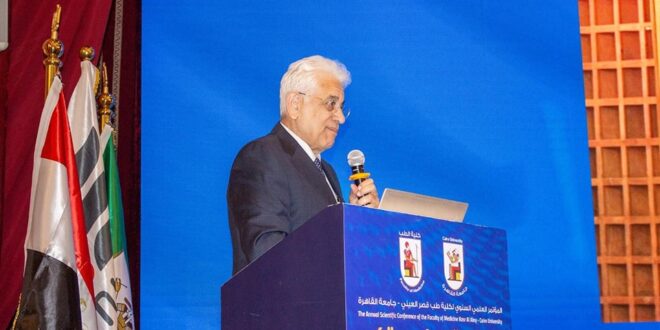Dr. Hossam Badrawi at the Annual Scientific Conference of Kasr Al-Ainy Faculty of Medicine: “Let’s Rethink Brain Drain”
Professor Dr. Hossam Badrawi, renowned intellectual, physician, and political figure, participated in the annual scientific conference of the Faculty of Medicine at Kasr Al-Ainy – Cairo University, held under the theme “Towards an Innovative Medical Society.” The conference took place from May 26 to 29, 2025, under the patronage of the Minister of Higher Education and Scientific Research, and was supervised by Prof. Dr. Sami Abdel Sadek, President of Cairo University, and Prof. Dr. Hossam Salah, Dean of the Faculty of Medicine.
Dr. Badrawi took part in a distinguished session titled “Brain Drain vs. Brain Circulation,” held on Wednesday, May 28, from 12 to 1 PM, alongside a select group of academics including Dr. Ashraf Hatim, Dr. Hesham El Miniawy, and Dr. Sherif Haqi, with moderation by Dr. Omar Azzam. The session saw a large attendance of medical professors, students, and individuals interested in healthcare development.
The following is the text of his speech:
Rethinking Brain Drain in a Globally Interconnected Medical World
1. Opening Remarks
Ladies and Gentlemen,
We’ve long spoken of brain drain — the loss of our best doctors, scientists, and creatives to the outside world — a term laced with pain and frustration.
But in this globalized world, I invite you to rethink the concept.
What if migration isn’t a loss, but a cycle? What if those who leave can still return, connect, or support from afar?
The question is no longer: Do they leave?
But rather: Do they return? Do they stay connected? Do they make an impact?
2. The Shortage of Doctors — Globally and Locally
The World Health Organization forecasts a global shortage of over 11 million healthcare workers by 2030 — developing countries being the hardest hit.
In Egypt, we have 8.6 doctors per 10,000 people, compared to a global average of 23.
Out of 220,000 registered doctors, more than 120,000 are working abroad.
In 2023 alone, 7,000 Egyptian doctors left the country.
Why?
- Low salaries
- Difficult work environments
- Lack of research opportunities
While abroad offers: - Better facilities
- Advanced training
- Broader career prospects
3. Brain Circulation – A Smarter Approach
Let’s look at India and China — returnees established universities, research centers, and tech companies.
In Egypt, our doctors abroad contribute through:
- Telemedicine
- Training new doctors (as seen during the COVID-19 pandemic)
- Health policy advising and development support
This is what we call “Brain Circulation” — a mutual exchange of knowledge, humanity, and science that benefits all.
4. Knowledge Remittances – An Intangible Asset
When we hear “remittances,” we think of money. But there’s something even more valuable: knowledge remittances.
Our doctors abroad don’t just send money — they send:
- Ways of thinking
- Professional ethics
- Educational models
They don’t just build clinics — they build people.
5. Role of Institutions – Global Doctors with Local Roots
Medical schools should redefine their missions:
Not just to graduate local doctors, but to raise globally competent doctors rooted in their homeland.
How?
- Visiting professor programs
- Joint research with global institutions
- Virtual exchanges between students and faculty
Here, the state’s role is crucial — to fund, honor, and support those who link science to their homeland.
6. From Restriction to Smart Circulation
Instead of restricting migration, let’s ask:
What makes a doctor choose to stay, return, or contribute from abroad?
My philosophy is simple:
Attract, don’t restrict.
- Improve infrastructure
- Offer competitive salaries
- Create dual-degree programs within Egypt
- Encourage smart partnerships:
- Exchange and training programs with other countries
- Overseas fellowships followed by return opportunities
“When brain circulation is smartly designed, it becomes an investment, not a loss.”
7. National and Diplomatic Benefits
- Egypt gains diplomatic influence by exporting healthcare talent
- Knowledge remittances fuel innovation and health sector development
- A successful circulation system attracts both returning talent and foreign professionals seeking dynamic environments
8. A Call to Action
- The Ministries of Health and Education must fund infrastructure and international certification programs
- Universities should sign three international partnerships within a year
- Professional syndicates must launch mentorship and return programs for expats
9. Conclusion
“The mind that migrates… can still serve the heart of the homeland.”
Let us manage migration wisely — and turn it into a force for growth, not a source of fear or regret.
Dr. Badrawi concluded his speech with deep insight and a visionary reformist tone, earning wide support and appreciation from the audience.
 Dr. Hossam Badrawi Official Website
Dr. Hossam Badrawi Official Website


